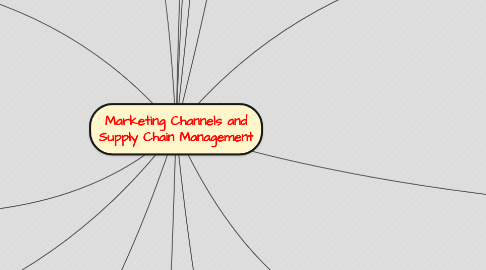
1. Distribution - Movement of goods and services from producers to customers
2. Marketing (distribution) channel - System of marketing institutions that enhances the physical flow of goods and services, along with ownership title, from producer to consumer or business user
3. Physical distribution - Broad range of activities aimed at efficient movement of finished goods from the end of the production line to the consumer
4. Channels Using Marketing Intermediaries
4.1. Producer to wholesaler to retailer to consumer
4.1.1. The traditional channel for consumer goods
4.1.2. Gives small producers access to hundreds of retailers
4.1.3. Gives small retailers access to wholesaler’s specialized distribution skills
4.2. Producer to wholesaler to business user
4.2.1. Industrial distributor - Intermediaries in the business market that take title to goods
4.3. Producer to agent to wholesaler to retailer to consumer
4.3.1. Common in markets served by small companies
4.3.2. Agent may or may not take possession of goods but does not take title
4.4. Producer to agent to wholesaler to business user
4.4.1. An agent or broker, often called a manufacturer’s representative, markets small producer’s offerings through large wholesalers
4.4.2. Provides an independent sales force to contact wholesale buyers
4.5. Producer to agent to business user
4.5.1. Independently owned wholesaler takes title to the goods
4.5.2. Common in transactions with large unit sales in which transportation is a small percentage of the total cost
5. Legal Problems of Exclusive Distribution
5.1. Exclusive dealing agreement - Prohibits a marketing intermediary from handling competing products
5.2. Closed sales territories - Restrict their distributors to certain geographic regions
5.3. Tying agreements - Allow channel members to become exclusive dealers only if they also carry products other than those that they want to sell
6. CHANNEL CONFLICT
6.1. HORIZONTAL CONFLICT Disagreements among channel members at the same level, such as two competing discount stores
6.2. VERTICAL CONFLICT Occurs among members at different levels of the channel
6.3. THE GRAY MARKET Goods produced for overseas markets that re-enter the U.S. market and compete against domestic versions
7. ELEMENT OF PHYSICAL DISTRIBUTION
7.1. Customer service
7.2. Transportation
7.3. Inventory control
7.4. Protective packaging and materials handling
7.5. Order processing
7.6. Warehousing
8. DIRECT SELLING
8.1. Direct channel - Carries goods directly from a producer to the business purchaser or ultimate user
8.2. Direct selling - Strategy designed to establish direct sales contact between producer and final user
9. Logistics - Coordinating the flow of information, goods, and services among members of the distribution channel
10. Supply-chain management - Control of the activities of purchasing, processing, and delivery through which raw materials are transformed into products and made available to final consumers
11. Types of Marketing Channels
11.1. Marketing intermediary - Organization that operates between producers and consumers or business users
11.2. Resellers
11.2.1. Wholesaler – firms that acquire large quantities of products from manufacturers/producers and then sort,store and resell them to retailers, businesses or sometimes end consumers. Takes title to the goods it handles
11.2.2. Retailers – all channel members who are involved in selling products or services to consumers. Takes title to the goods it handles
11.3. Brokers
11.3.1. Agents – people who facilitate the exchange of products but do not take title(i.e purchase) anything that they sell.
11.4. Facililtators
11.4.1. Transportation companies –organizations that assists in the distribution of products but do not take title or negotiate sales.

